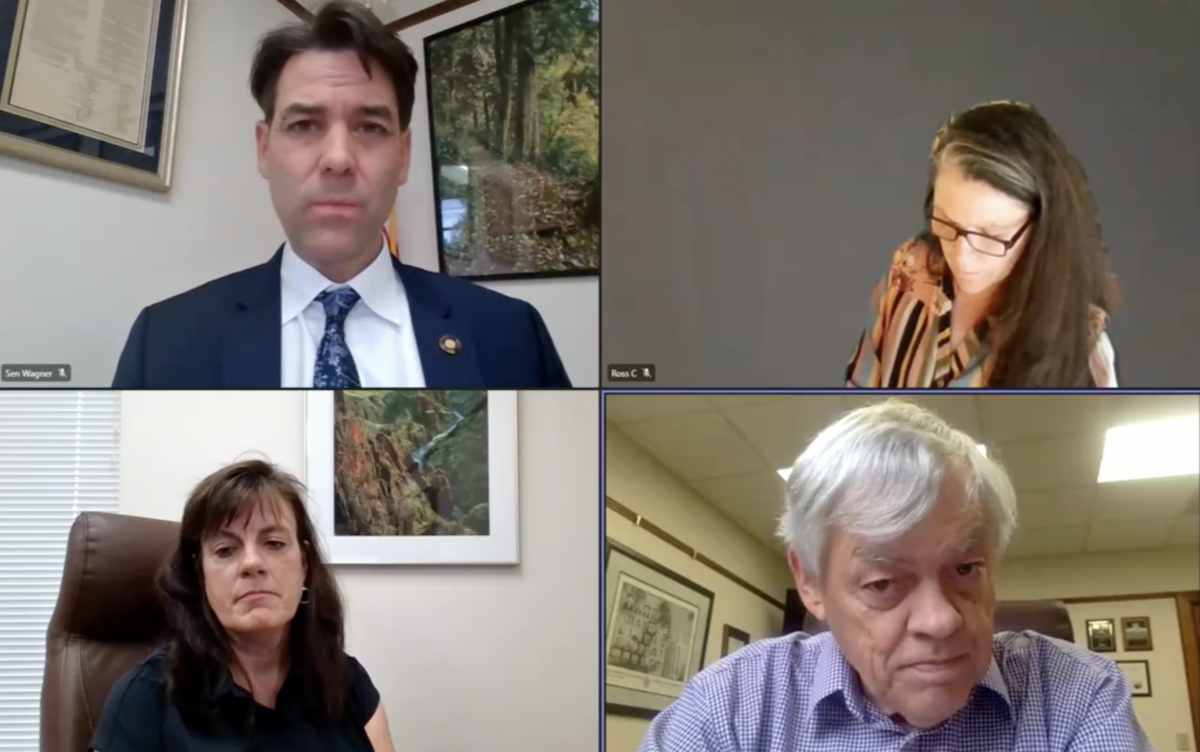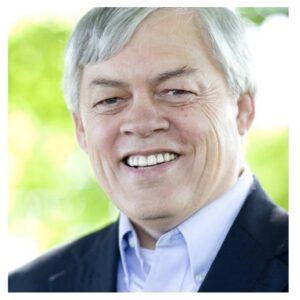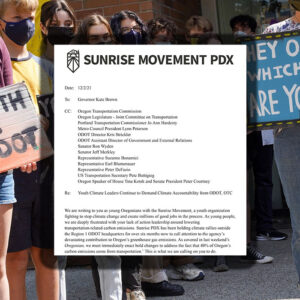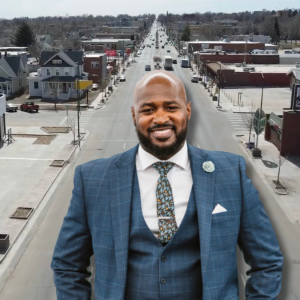
“I’m concerned about the roads for Oregon’s economy… I like to say that Oregon’s economy moves on wheels and those wheels need something to roll on.”
-Lee Beyer
Yesterday afternoon, the Oregon Senate Interim Committee On Rules and Executive Appointments heard from the more than 60 of Governor Kate Brown’s nominees to various state boards and commissions. Among those nominees was outgoing state Senator Lee Beyer, who Brown has nominated to one of the five spots on the Oregon Transportation Commission much to the chagrin of many concerned Oregonians.
The OTC is a powerful body that oversees the Oregon Department of Transportation and their $5 billion budget.
Some leaders from prominent transportation and environmental groups see Beyer’s appointment as a step in the wrong direction, with some opponents saying Beyer’s appointment will “double down on the past” instead of looking to the future with “more inclusive, representative transportation decision-making.”
“In these divisive times, it is imperative that we continue to support and celebrate leaders like Senator Beyer.”
– Andrew Hoan, Portland Business Alliance
Beyer will replace Alando Simpson, a much younger, Black member of the commission. In the Portland Mercury yesterday, Beyer brushed off those concerns. “Transportation is transportation,” Beyer told the Mercury. He also said opposition to the I-5 Rose Quarter freeway expansion is “baffling” and “noted he is ‘not a complete believer’ in induced demand.”
Despite this surge of opposition, no senators on the Rules Committee took up concerns with Beyer’s appointment, and nobody spoke up in opposition to him at the meeting’s public comment period. After Beyer had a chance to introduce himself to the committee, they moved forward with his nomination as standard procedure.
One group did show support for Beyer in response to community backlash over his nomination: the Portland Business Alliance (an organization activists have deemed one of Portland’s ‘climate villains’). President and CEO Andrew Hoan submitted a letter of support for Beyer’s nomination, stating the senator is “perhaps the most prepared Oregonian to serve on the OTC,” having “proven to possess a deep knowledge of the transportation needs of the entire state and will collaborate with his colleagues and stakeholders to advance the balanced transportation solutions we will need in the 21st century.”
“Senator Beyer has unquestionably been one of Oregon’s most effective leaders advancing multi-modal transportation infrastructure, and modernization policy and funding proposals in Oregon. He has successfully worked to find the right balance between expanding transportation access, supporting the movement of goods, maintaining our infrastructure, and reducing carbon emissions,” Hoan writes. “In these divisive times, it is imperative that we continue to support and celebrate leaders like Senator Beyer.”
Advocates say Beyer’s “balance” between transportation objectives has been heavily weighted toward driving-centric infrastructure. Over his time in the Oregon senate, Beyer supported projects like the Interstate Bridge Replacement Program plan to expand I-5 from Portland to Vancouver and its failed predecessor, the Columbia River Crossing. He also shot down a bill to increase state funding for biking and walking infrastructure.
When speaking at yesterday’s Rules Committee meeting, Beyer addressed community apprehensions that he’s “only concerned about roads,” saying that claim is not true.
“I would draw people’s attention back to what we did in 2017,” Beyer said, referring to the transportation legislature House Bill 2017, which he was a primary champion of. Beyer said this bill included the “largest infusion in the state’s history in expanding transit,” a “solid commitment” to Safe Routes to Schools infrastructure and “dedicated funding to off-road bicycle paths.”
Though HB 2017 was a landmark transportation bill in Oregon that gave an unprecedented amount of funding to public transit and active transportation infrastructure ( a very low bar), it was overwhelmingly focused on freeway expansions and highway projects.
In his remarks (read them in full below), Beyer said he thinks roads are important for the state’s economy.
“One point that I would make – I am concerned about the roads and I’m concerned about the roads for Oregon’s economy. Oregon is an exporting state. A lot of the products that we use and find in our stores get there on a truck,” he said. “I like to say that Oregon’s economy moves on wheels and those wheels need something to roll on.”
Beyer is the second OTC pick from Governor Brown since November 2021 that doesn’t meet the demands of Sunrise PDX and the Youth vs. ODOT movement. The governor also didn’t heed the demands of over thirty organizations statewide that asked her to hold off on this selection.
That push was led by The Street Trust Executive Director Sarah Iannarone who posted her reaction to Twitter this morning. “Governor Brown dismissing out-of-hand concerns from 30+ leading advocacy orgs and coalitions on this matter is really disheartening,” she wrote. “If she’s not listening to us, who’s she listening to?”
Beyer’s full comments to the committee are below:







Thanks for reading.
BikePortland has served this community with independent community journalism since 2005. We rely on subscriptions from readers like you to survive. Your financial support is vital in keeping this valuable resource alive and well.
Please subscribe today to strengthen and expand our work.
File this away as an example of how out of touch most BP commenters are with the CURRENT political realities of the state as a whole. I think there were a total of 3 BP articles over the past week focused on rising opposition among activists over Senator Beyer’s appointment by Governor Brown and in the end it didn’t even register as a blip on the political radar in Salem.
Agreed, unfortunately. THis is alos a great example of how completely unconcerned Gov Brown and our elected officials are about climate change depsite making noises about being concerned about it.
The decision to expand highways or not is going to barely move the needle on carbon emissions. You know what will? Electric vehicles and renewable energy.
What about opposition not having an effect makes you think commenters are out of touch? Wouldn’t opposition show that people understand the current realities?
Of course anyone can and should reach out to their governement representatives to chime in on an issue, but as you said, bicyclists are a small blip compared to the moneyied interests of autos, trucking, and commerce.
It’s very rare anymore for a politician to be “brave” and stick by something that’s going to lose them the next election.
C’est la vie.
You imply that the current political realities drove this decision. Not knowing much about Oregon politics, I would appreciate a brief explanation of what you think those realities happen to be. thanks
This does not come off as a very effective opposition campaign. For all the growing momentum against Beyer, that’s a pretty disappointing no show at the actual meeting. Not too surprising that the committee recommended confirmation when they hear no public comments in opposition and get just one opposition letter from a single citizen (https://olis.oregonlegislature.gov/liz/2021I1/Committees/SRULES/2022-09-21-14-30/MeetingMaterials).
There was so much effort on getting more signatures on the letter to the governor. It’s like there wasn’t even an awareness of the committee’s public participation options (agenda posted on 9/16 had instructions for commenting at the meeting and submitting written comments beforehand).
Direct appeals to the governor to reconsider the nomination didn’t work. This recommendation process was a big missed opportunity. Is there any better strategy for when this gets brought to the senate?
I agree, its kinda sad no one showed up.
A lot of people wrote to the individual senators on the committee, asking them to oppose the confirmation of the nomination. But obviously those letters and emails had no impact. Looks like no one wanted to go against the governor.
Cycling is sacrificed on the altar of the motor vehicle-money complex.
This really brings into question the capability of the advocates. The Street Trust in particular seems better at moral posturing than actually getting victories.
Not testifying, not submitting letters to the record, not meeting with members of the committee. These are the basics of lobbying/political advocacy. These seem beyond The Street Trust. Just such an ineffective organization at this point. People should be questioning the leadership.
“Beyer is the second OTC pick from Governor Brown since November 2021 that doesn’t meet the demands of Sunrise PDX and the Youth vs. ODOT movement. The governor also didn’t heed the demands of over thirty organizations statewide that asked her to hold off on this selection.”
This is a further illustration that making “demands” of decision makers is not an effective means of garnering agreement. One can express an opinion or request consideration for their preferred option but at the end of the day elected decision makers set policy. Elected officials generally represent the majority opinions of those that elected them. If your opinions seemingly have no sway you might reasonably conclude you are not representative of the majority opinion in the community. If you want to have sway get busy and create a majority within the the political mechanism. Making demands will not accomplish that outcome.
I completely agree with you. Along a similar line, I’ll also note Sarah Iannarone’s quote:
At this point, I don’t think anyone is listening to her, since she’s utterly destroyed all her credibility in the past year and a half through various missteps like that ill-advised letter. I’ll also add that I don’t think I’ve ever once heard one of these activists admit that they could even possibly be wrong about something. These people have a majorly-inflated sense of self-importance, and it’s straight-up hurting the very causes that they claim to advocate for.
I won’t mince my words: if you’ve tried an advocacy tactic and it’s failed to gain traction every single time, it’s time to switch gears and try something else instead of just repeating the same tactics over and over again with no results.
I disagree, No Name. If you have a point of view, you should feel free to make it known. This isn’t Russia.
And it’s pretty clear that the majority is wrong a lot of the time, and it’s wrong in this situation, where we’re all driving ourselves to planetary oblivion.
Nowhere did I say the majority is right, and nowhere did I say that you shouldn’t make your opinion known. You’re continuously misrepresenting my arguments and not even attempting to course correct, so this will be my last reply to you.
“Governor Brown dismissing out-of-hand concerns from 30+ leading advocacy orgs and coalitions on this matter is really disheartening,” she wrote. “If she’s not listening to us, who’s she listening to?”
Maybe they should consider the fact that their views are not mainstream. There’s a reason the stereotypical mode of transportation in Oregon is a Subaru
The most popular automobile type sold in Oregon is the disgusting and homicidal-by-design SUV.
https://www.koin.com/news/suv-pickup-sedan-which-vehicle-type-is-the-most-popular-in-each-state/
The 30+ advocacy groups trying to influence Governor Brown without money or mainstream protests don’t move the needle. We need to better prepare for the next appointments and elections.
Perhaps it’s the willingness ot these establishment nonprofits and “movement” groups to support and campaign for right wing liberals like Brown and Kotek that is not moving the needle. When the democratic party machine takes “progressive” support for granted why would they pay attention to asks from progressive groups that lack dough (contributions-payola) and political power.
Which said machine can do due to those voters’ adherence to “lesser of two evil” voting. As I have and will continue to argue, it’s a rational argument in the scope of one election, but a long-term loser over many.
(not arguing any particular point of soren’s, it just dovetails neatly to a common theme of mine)
The Oregon Democratic Party doesn’t really care about climate change. If they did they’d stop voting for more and more billions for freeways and put the big bucks into transit and biking. There needs to be serious primary challengers and ballot measures to kill the wasteful and polluting freeway projects.